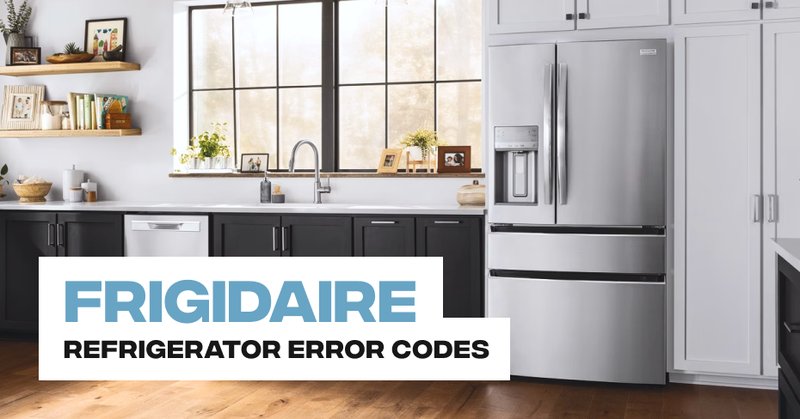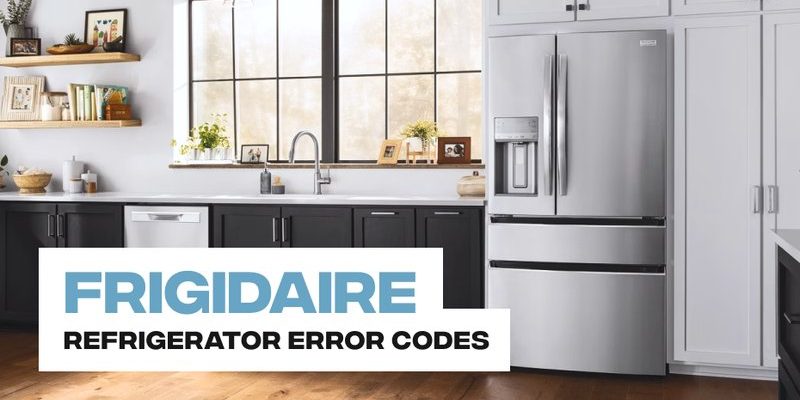
Frigidaire refrigerators are known for their reliability and advanced features, yet like any appliance, they can occasionally face hiccups. The error code E2 typically signals an issue with the refrigerator’s freezer fan speed. Think of it like your fridge’s internal cooling system trying to tell you, “Hey, something’s off with my airflow!” Recognizing what these codes mean is crucial to keeping your appliance running smoothly. With a bit of guidance, you can address the issue without getting overwhelmed.
Understanding Error Code E2
So, what’s the deal with the E2 error code? In layman’s terms, it indicates a problem with the communication between your refrigerator’s control board and the freezer fan. Imagine if you were trying to whisper instructions to someone across a noisy room—that’s the kind of communication frustration your fridge is experiencing.
Every refrigerator has a fan in its freezer compartment to help circulate air and maintain an even temperature. This fan ensures your ice cream stays solid and your meat doesn’t spoil. When the fan isn’t working correctly, the whole cooling process can go awry. The control board monitors this fan, and if it detects a problem, like the fan spinning too slowly or not at all, it sends out the E2 error code to alert you.
If left unresolved, the consequences can be like leaving a window open during winter. Your fridge will work harder to keep things cold, potentially increasing your energy bills and even causing the motor to wear out faster. Understanding this issue is a great first step toward keeping your fridge in tip-top shape.
Common Causes of Error Code E2
Now, let’s dig into the nuts and bolts of what commonly causes this error code. First on the list is dirt and debris buildup on the fan blades. Over time, dust can accumulate, much like how cobwebs settle in unused corners of your house. This buildup can slow down the fan’s rotation, preventing it from operating efficiently.
Another frequent culprit is electrical connections. Wires and connectors can become loose due to vibrations or even normal wear and tear. Imagine trying to listen to music on headphones with a loose jack—frustrating, right? Similarly, if the control board can’t “hear” the freezer fan properly due to a loose connection, it assumes something’s wrong.
A faulty fan motor itself could also be to blame. Over time, motors can burn out or wear down, much like an overworked engine. Signs of a failing motor include unusual noises or the fan stopping completely. If you notice these signs, it might be time to replace the motor to get your fridge back on track.
How to Fix Error Code E2
So, what can you do when faced with this pesky E2 code? First things first, try a reset. Unplug your refrigerator for a few minutes and then plug it back in. Sometimes, this is enough to clear out minor glitches, similar to restarting your computer when it acts up.
If the reset doesn’t do the trick, consider checking for visible issues like dust buildup on the fan. Cleaning the fan blades might sound technical, but it’s easier than you think. Gently remove the back panel inside the freezer to access the fan and use a soft brush to clear away any dust.
For more persistent cases, examining the wiring is a good move. Ensure all connectors are snug and free of corrosion. If everything seems in place and the error persists, you might have to call in a professional. Attempting to repair or replace electrical components on your own can be risky without the right tools and knowledge. Professionals can diagnose and pinpoint the exact issue, whether it’s a faulty motor or a more complex electrical problem.
Preventing Error Code E2 in the Future
Wouldn’t it be great to sidestep this issue entirely? Well, the key is regular maintenance. Keep an eye on your fridge’s cleanliness. Just like vacuuming your living room, a quick wipe-down of the interior can make a world of difference. Ensure the vents aren’t blocked and the airflow isn’t restricted by overstuffed shelves.
Routine checks on electrical connections can also be a game-changer. By periodically inspecting the back of your fridge, you can catch loose wires or corrosion early on.
Investing a little time in regular maintenance can save you from the hassle of unexpected breakdowns. Plus, your refrigerator will thank you by running more efficiently and lasting longer. Remember, while a DIY approach can solve minor issues, don’t hesitate to reach out to an appliance repair expert for more complicated fixes. It’s better to be safe and let the pros handle the electrical stuff.
By staying informed and proactive, you can keep your Frigidaire refrigerator running smoothly and error-free. If you ever encounter the dreaded E2 error code again, you’ll know exactly what to do. Happy cooling!
